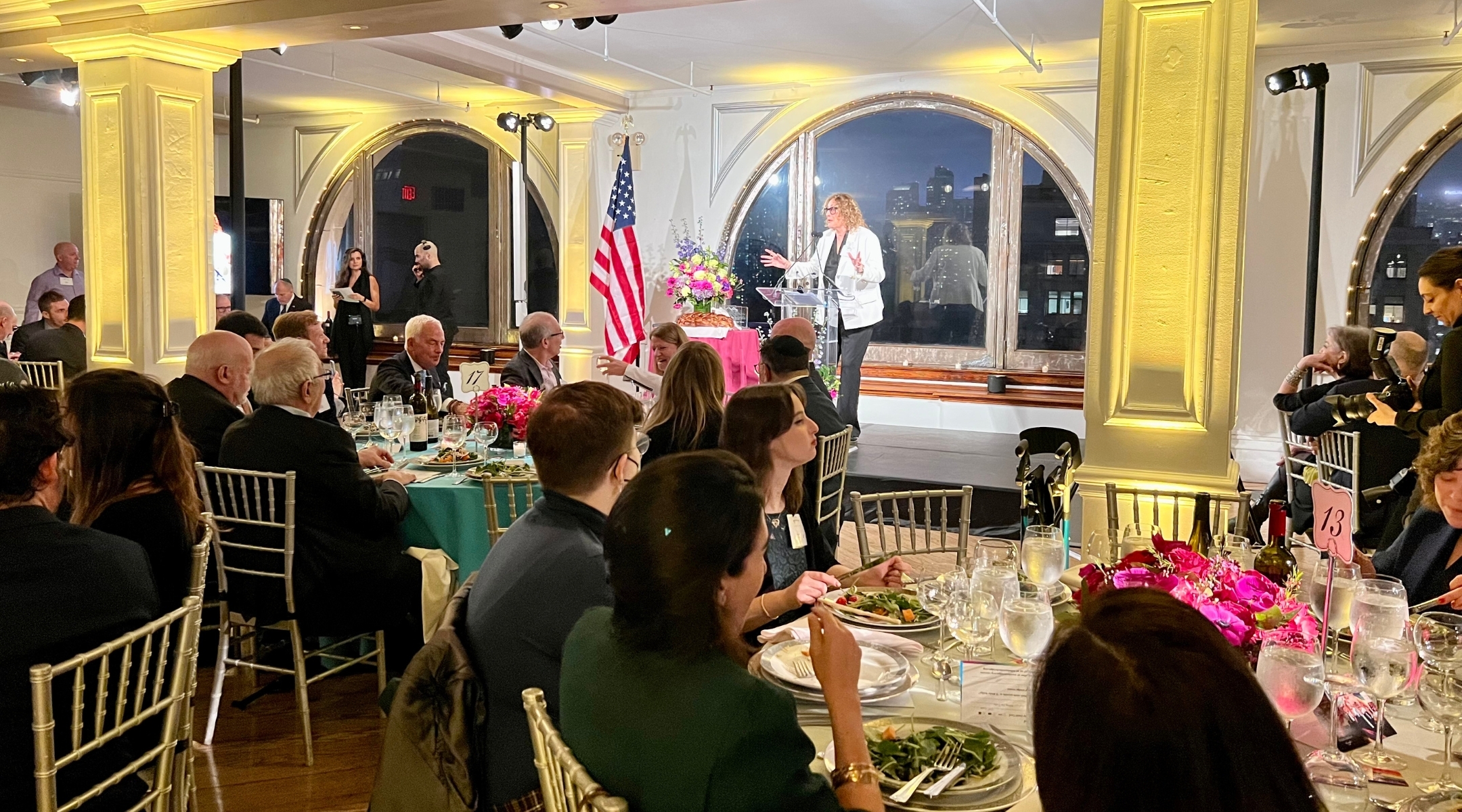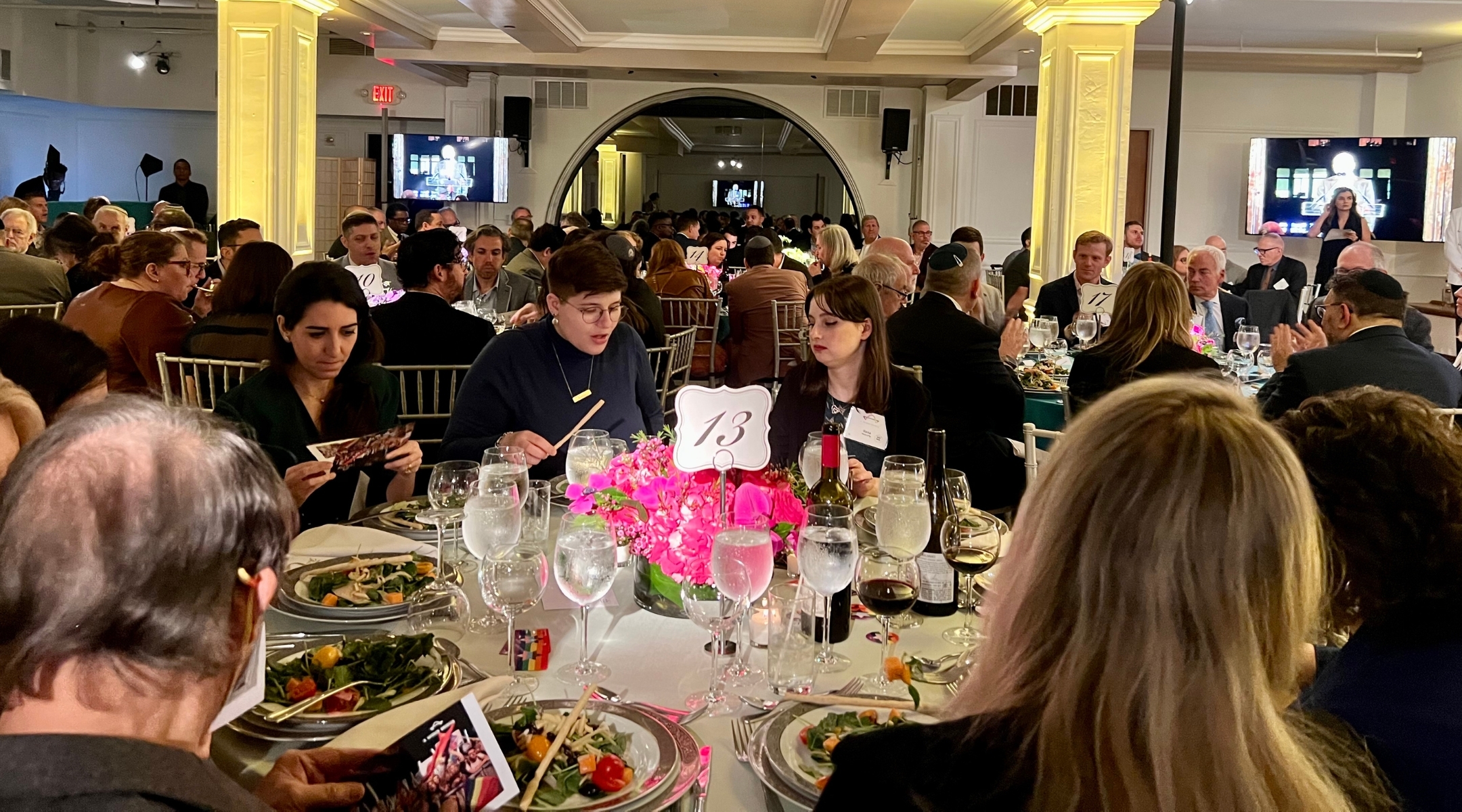For Zionist LGBTQ group, Israel’s right-wing government has created an urgent crisis
A Wider Bridge has doubled its donations to Israeli LGBTQ groups this year, in the face of an Israeli government that includes anti-LGBTQ officials

Comedian Judy Gold hosted A Wider Bridge’s annual gala, which celebrated Israel at 75 and addressed growing anti-LGBTQ sentiment with the new government coalition elected in January. (Jackie Hajdenberg)
(JTA) — The annual gala of A Wider Bridge, a Jewish LGBTQ group, had all the trappings of a festive event: Guests arrived in cocktail attire finery — one woman wore a tiered, ruffled rainbow dress — to enjoy salad, rice, chicken, an assortment of desserts and schmoozing — and to celebrate the achievements of four Jewish activists.
But even though it was the group’s first in-person gala since before the COVID-19 pandemic, the mood on Monday night wasn’t entirely celebratory. Throughout the speeches and sideline conversations was the sense that A Wider Bridge — which advocates for the LGBTQ community in Israel, and for Israel in the U.S. LGBTQ community — was entering a new and uncertain era.
“For Israeli LGBTQ, the ground has shifted beneath their feet,” the group’s executive director, Ethan Felson, said in a speech to the crowd of about 200 attendees. Citing LGBTQ activists in Israel, he added, “Calls to crisis hotlines are up. Incidents of emotional and physical violence are up in Israel against the LGBTQ community. … You can imagine the challenges the trans community is facing — a full assault on their rights and on their lives.”
The crisis Felson depicted has materialized under a new Israeli government that includes vocal anti-LGBTQ officials in senior positions, whose signature legislation to reform the judiciary threatens the set of LGBTQ rights that Israel has long pointed to as evidence of its open society.
That new reality has complicated the work of A Wider Bridge both in the United States and Israel, and interspersed in the night’s program — speeches celebrating four honorees, some stand up comedy from Jewish comedian Judy Gold, and even a recorded video from Vice President Kamala Harris — was an acknowledgement of the challenges facing LGBTQ rights in Israel. It has also caused the group to double its donations to Israeli LGBTQ groups this year.
“I’ve been in this work for 35 years, and through very complex times, I’ve never felt a greater sense of urgency,” Felson told the Jewish Telegraphic Agency at the event. “The urgency of this moment overshadows everything I’ve certainly done in my career.”
The gala, which took place in an event space whose vast windows overlooked Manhattan’s Union Square, occurred at the same time that Israeli Finance Minister Bezalel Smotrich visited the Hasidic community in Crown Heights, Brooklyn. Smotrich has called himself a “proud homophobe” and sits in Israel’s governing coalition alongside Avi Maoz, who heads the anti-LGBTQ party Noam. The coalition also includes haredi Orthodox parties that have long opposed LGBTQ rights.

Legislation the coalition is now advancing to sap the Supreme Court of much of its power and independence also endangers LGBTQ rights in Israel. While same-sex couples are not permitted to legally marry in Israel, the court ruled in 2006 that the country must recognize same-sex marriages performed abroad. A court decision in 2021 also paved the way for LGBTQ couples to have children via surrogacy.
“The conversation about the Israeli LGBTQ community has changed dramatically,” Felson said. “The Israeli LGBTQ community was always perceived as safe, secure and successful and not among the vulnerable constituencies. But that wasn’t an accurate picture. It’s always been vulnerable to conversion therapy, transphobia, violence. And there are ministers in this current government that make those situations worse, that play on those vulnerabilities.”
But Felson said that the core work of A Wider Bridge in the United States — to cultivate relationships between Israeli LGBTQ groups and those here — will not be diminished because of who is in power.
“We love Israel as much today as we did yesterday, as much as we did last year,” he said. “We hold Israel and its LGBTQ community close. And a country is more than its leaders at any time.”
He added, “We never lobbied for a government. We never were in this to support a government. And so it has been a truism of everybody involved in this conversation about Israel that there have been governments that have come and gone, with which we’ve aligned or haven’t aligned — that doesn’t change the equation of our connection to a country.”
Since the beginning of the year, A Wider Bridge has donated $180,000 to 20 different Israeli LGBTQ organizations — the same amount it has given annually in recent years. At the end of the evening, Felson announced an emergency campaign to raise another $180,000, adding that the organization received a $75,000 anonymous match to start off the campaign.
Other speakers also discussed the changing situation for LGBTQ Israelis in forthright terms. In a prerecorded video, Rotem Sorek, CEO of Ma’avarim, a transgender advocacy organization in Israel, said that since the new government coalition took over, she has noticed an increase in phone calls to her organization’s crisis call center.
“What’s happening right now is there is a shift in power, a particular new brand of transphobia,” Sorek said. “People start to believe that trans people are not regular human beings.”
Harris’ prerecorded remarks didn’t address the situation in Israel and instead focused on honoree Roselyne “Cissie” Swig, a longtime donor to the group from San Francisco who received its Tzedek Award. But Swig herself sounded a note of concern about LGBTQ rights in Israel in her acceptance speech.
“I’m old enough now to have been part of the beginning of Israel,” said Swig, who is in her early 90s. “What I think it’s going through right now, from a legal point of view, is a little unsettling for me, and I’m sure others. And I would prefer that it was more stable.”
But Felson said that although his group is facing a new set of daunting challenges, he doesn’t feel like he and his colleagues are alone.
“People are keenly aware now that there are problems that can’t be swept under the rug,” he said. “These are not debates about fine policy points. This is an existential debate.”
This article originally appeared on JTA.org.





















